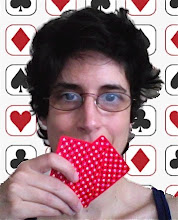Day 160: The Good with The Bad
I've been in a pretty foul frame of mind the last few days, and it hasn't improved the quality of my play one little bit. This afternoon found me throwing a magazine half-way across my living room, in sheer frustration. The angst was brought about by a combination of factors, the proximate cause being the abrupt accidental termination of an hour-and-a-half-long support call trying to address my currently VERY SHODDY high speed DSL connection. That was the final straw. It wasn't helped by the observation that, at that point, it was too late for me to get to the gym before my afternoon social engagement.
So I toddled off to a Chinese New Year party being thrown by my friend, the first one which she was hosting with her husband as the new parents of a one-year-old adopted from Taiwan. It was a chaotic scene, more appreciated for the quality and quantity of friends and good feelings than the material provisions. I had a lovely time, and I left a few hours later in a vastly improved mood.
I proceeded directly to the Crime Scene Game and went on something of a rush. There were a couple of unusually soft customers in the mix, I played well, and I quintupled my buy-in in relatively short order. I then gave a couple of buy-ins back, but by the time I cashed out, I was still in good shape. I should have left earlier, but I guess I got a little greedy.
Learning how not to start playing well only when coming from behind and how to consolidate and maintain a win remain two of my tougher challenges. It's two ends of the same problem. I also noticed that I started playing with scared money toward the end of the evening, when I began worrying about protecting my profits. (I definitely misplayed one hand because of that: I was much too passive and failed to make a continuation bet and/or a re-raise when I knew I ought to. Either play would have given me the pot.)
As is usually the case, these are things I know I'm doing wrong as I do them. I just have to find a way to STOP DOING THOSE THINGS. It's not rocket science, really.
Still, month six is off to a decent start.

4 Comments:
I recommend Mike Caro's book "Caro's Most Profitable Hold'em Advice".
In this book, he speaks about the fact that "preserving a win" is an artificial constraint that prevents you from playing optimally all the time. You should be thinking of your cash game poker as one long, unending session - each and every decision should be made with intention of maximizing profit. When you start worrying about "preserving a win", you are minimizing loss, which isn't always the same as maximizing profit.
There is lots of other good stuff in this book.
Thanks for the comment, Matt. I am indeed mindful of the "one long session" theory. But the challenge I have is a variety of "win tilt," where I play differently because I'm ahead. The "scared money" syndrome is the reverse side of the same problem.
One temporary fix for would be to have the discipline to simply stop playing when I achieve a certain return on my money. Obviously, it's not the ultimate cure, because one shouldn't leave a game where one has a big edge as long as one is still playing well. It's making sure that the latter is the case that's the hard part for me, so I'm working on tackling the problem one segment at a time.
Those last few paragraphs sure sound familiar ;)
Dealing with the phenomenon you're talking about as it occurs in my universe is a bit different, primarily because there's not really any notion of 'continuity'. The players aren't the same people throughout a session. The behavior doesn't change or evolve.
You enter a trade, you exit a trade then that trade no longer exists. You can't consider it. The psychological bloodbath of trying to avoid "getting your money back!" on a bad trade is really awesome.
It's only through disciplined rules that it can be overcome. First learn to follow your rules. Get to the point where you can trust that you will actually do it. Then work on the quality of those rules.
Then you can look at a loss and say either:
- I didn't obey the rules. Bad monkey, no biscuit.
- I DID obey the rules... but the rules were bad and need amendment (very very good monkey. two biscuits.)
- I obeyed the rules just fine. But the Universe had other plans... wasn't my fault... I would've done the same thing again.
But of course the divergence between day trading and poker playing is no doubt surprisingly large and small.
(Yeah, I FINALLY found my way here. Thank God!)
Welcome, Mad William! It's about time! ;)
Post a Comment
Subscribe to Post Comments [Atom]
<< Home